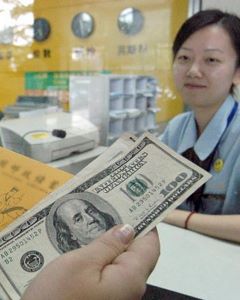
CHINESE A-SHARES were sharply higher today, with the benchmark Shanghai Composite Index up 2.90% at 2,586.21 and the Shenzhen index jumping by an even newsier 3.44%.
Meanwhile, shares in Hong Kong added 0.74% to finish today at 20,286.71.
However, rumblings of a decided lack of substance, specifics and a lack of action related to Beijing’s three-day old announcement that it would liberalize the yuan-dollar exchange rate are beginning to temper market enthusiasm somewhat.
On Saturday, safe in the comfort zone of a non-trading day, the People’s Bank of China announced on its website that: “In view of the recent economic situation and financial market developments at home and abroad, and the balance of payments (BOP) situation in China, the People´s Bank of China has decided to proceed further with reform of the RMB exchange rate regime and to enhance the RMB exchange rate flexibility.”
Over the following three days, the sheer volume of analyst takes on what industries would benefit, which would suffer, and where they were redirecting their cash was the stuff of legend.
However, some are suggesting that a bona fide Beijing nod to a free floating currency anytime soon are also perhaps just that -- legend.
Paraphrasing the late great Samuel Clemens, it would appear that reports of the renminbi’s imminent revaluation are grossly exaggerated.
But that did not stop market experts and politicians from weighing in on “winners and losers” from Beijing’s decades-old de facto peg to the US dollar.
Even US President Barack Obama from quickly issuing very public praise of China's moves to "allow its currency to float."
Therefore, if China ends up doing absolutely nothing different from the status quo, there will be many embarrassed world leaders and analysts to answer to over the next few days and weeks.
A close reading of Saturday’s announcement from the PBOC, and a further clarification from a news conference just completed offers little substance and few changes, if any, from existing exchange rate policy.

In fact, the PBOC spokesperson today explicitly stated that there would be NO one-off revaluation a la 2005, and that there would be no widening of the daily allowable fluctuation range.
So is Beijing simply buying time until after its G20 meeting in Toronto next week?
The buildup to the Canadian summit was recently looking like it would put China on the hotseat for amassing a surprisingly large trade deficit in the first three months.
However, with the Central Bank announcement over the weekend, however vague on commitments, it seems that it is enough to deflect criticism for now of what many of China’s global trading partners contend is an artificially undervalued yuan as part of a broader policy of neo-mercantilism.
Whether or not the PBOC statement has teeth or not will no doubt be revealed in the coming days, but the fact that Beijing did appear, if not in letter than in spirit, to be moving toward a more market-determined exchange rate did lift markets in the reason for a variety of reasons.
Short term valuation gainers from revaluation talk were financial institutions and property developers.
Pudong Development Bank rose 4.17% to 14.48 yuan, China Merchants Bank added 3.89% to 13.36 yuan and Minsheng Bank was up 3.06% at 6.39 yuan.
Commercial airlines and paper makers were also expected to get a big boost due to their heavy reliance on imported planes and fuel in the former’s case, and pulp in the latter.
Analysts are predicting a somewhat turbulent week, with a strong upside potential likely if more details, visibility, and action are evidenced from Chinese authorities following the Saturday announcement from the PBOC.
See earlier related story here







